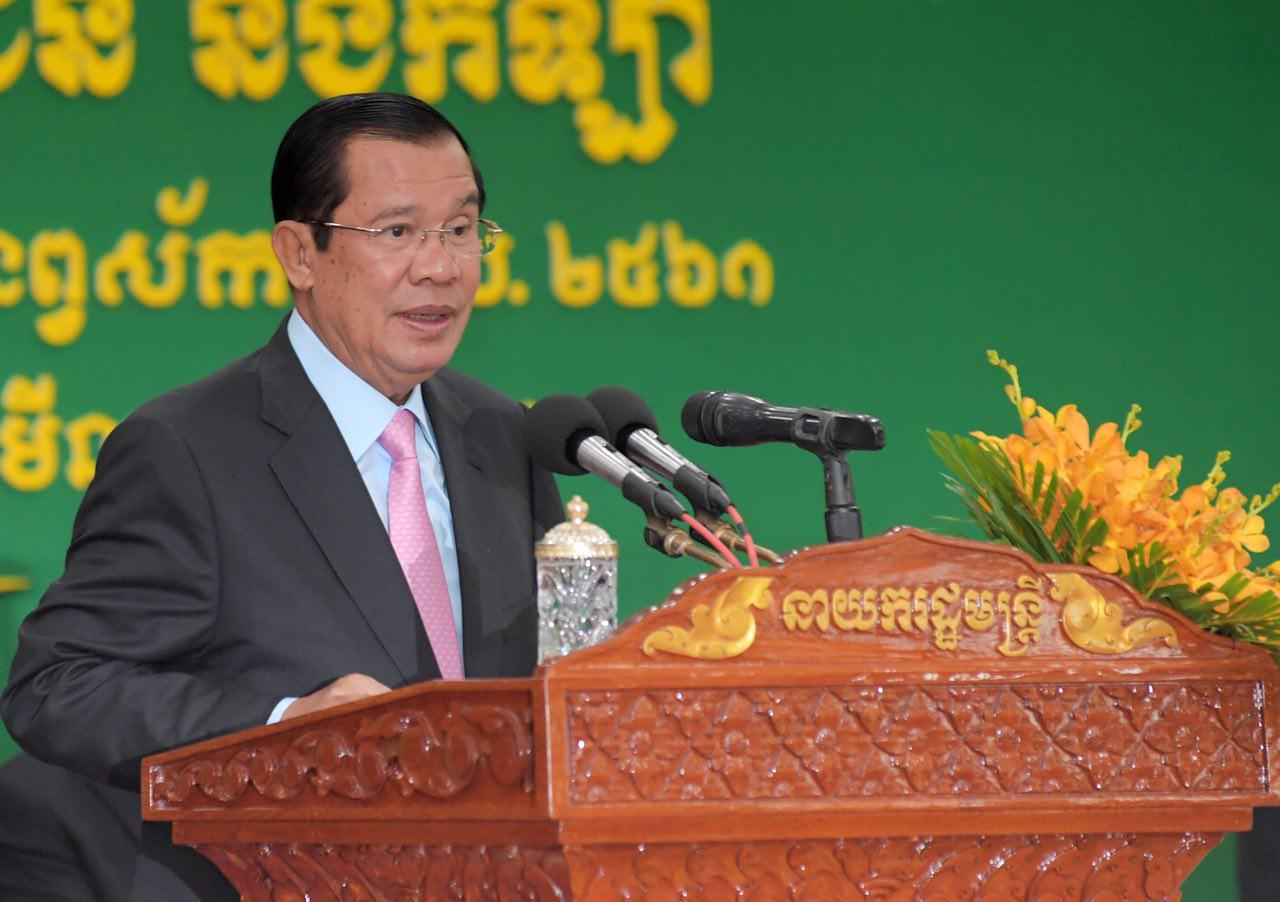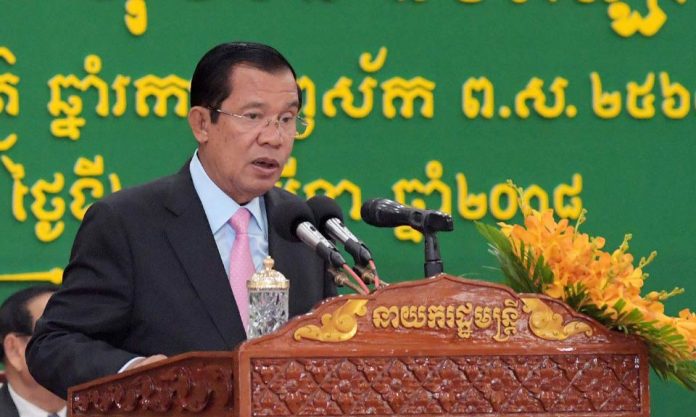No Country Destroyed to Its Root as Cambodia
… Yesterday I attended the annual conference of the Ministry of Education, Youth, and Sports to review what have been done and achieved in 2016-17, and what need to be pursued and fulfilled for 2017-2018. It is a good exercise to pinpoint a vision for further reforms. I have no need to bring those issues back up but we should all see a whole process of gradual progress that we are making from the time that we had had so much difficulties. I may say that in this world there is no particular country destroyed to its root in every field, education included, as in Cambodia.
As Foreign Minister, I travelled to many countries. I observed that many had gone through war-torn period after winning independence, but they always have rebuilt their countries on soft and hard infrastructures remained intact. For us, after the liberation from the regime of Pol Pot, we have nothing left but to start everything from scratch. However, those hardships have become our national pride. You may be young but your parents and grandparents have shared those difficulties with leaders of the Cambodian People’s Party to liberate the country and prevent possible return of the regime of Pol Pot on one side and to restore every sectors of life on the other.
Standing Up in “Punishing” Time
Maybe I should bring up an issue regarding a school in Mali “Hun Sen-Bamako Secondary School.” Why had I helped build a school that far away? It was relating to a life of a director of an NGO, who used to work in Mali. I had visited the country too in the past. I met one of their Presidents, who took power by means of a coup […] he later was removed by a coup too. It was a generational revenge. I met that President in Mali when Ms Eva Mysliwiec was in Cambodia founding the Cambodia Development Resource Institute.
After the coup leading to death of the President, she was expelled from Mali and went back to the United States, where her father died. In sadness, she travelled to Cambodia to see Cambodian difficulties after the regime of Pol Pot. Thinking of coming for just a few months, she turned out to be a foreigner who lived the longest time in Cambodia and becomes a Cambodian citizen. She returned to Mali though. She raised fund to help build a secondary school in Bamako, Mali, where we also have our peacekeeping troops stationed there […]
In our subsequent meeting, she told me about what is happening in Mali. I was shocked to hear she compared Mali to Cambodia in 1980s. It was a country that was more advanced than Cambodia when I visited it in about 1983 […] I brought this matter up for you as a comparison for us to see our joint efforts in standing up with difficulties and international “punishment” that embargoed us. They would give us no development assistance […] except some small humanitarian things. They gave us no development assistance for human resource training or scholarships […]
Reason why French Falls Behind
… As far as French language is concerned, that I mentioned the other day, I went to France in 1982. There are many political parties – RPR, the Socialists, the Communists, etc. In a working meal, I said to them that French language is falling behind. France should pay attention on it as a country of former colony using French language. I suggested they should reopen a French Cultural Centre or Alliance Francaise in Cambodia. An RPR member of the French parliament said “France does not recognize your government. There is no reason for us to have a French Cultural Centre of Alliance Francaise in Cambodia.” I responded to him it was a suggestion in the French interest. Cambodia, you may remember, have its Khmer language, and secondly I sent students to (the former) Soviet Union and Eastern Europe, and they may study English should they wish to […] Well, finally they came in 1990, while they should have done long ago […]
In a meeting of the Francophone countries, they suggested promotion of French language. It is true that I make every effort for cooperation with Francophone countries but I cannot force people’s wish. Young people these days learnt English and beside English they choose Chinese. So I do not know what is in store for French language here. Nevertheless, we still learn law and medicine in French. We must make further efforts together to keep it up […]
Human Resource – Relentless Priority
… As for human resource, it is a high priority. In the course of ASEAN-Australia Summit, there was a good program indicating attention on connectivity and people to people relation, which includes of course youth to youth relation too. Some had organized meeting, for instance, the Cambodian Prime Minister meets with Australian students and a Cambodian student. Those Australians are on their studying tour in Cambodia and can speak Khmer. This year, according to plan, Australia will send over 800 students for studying visits to ASEAN, and the ASEAN countries will send their students for training in Australia too […] through education, Cambodia has many years already made relentless effort to promote and drive human resource priority into a new phase […]
Every Sector Investments Bears Repercussion on Education
… As you can see now that our efforts have brought about a new phase of development in education […] soon we will come to a twelve years plus four teachers training program in regional pedagogical level. We are promoting this program to strengthen our teachers’ capacity, the result of which will drive our human resource training further. This has called for hard investments in every field since they will have interactions and interrelatedness on one another, thereby on education. For instance, we are building a road, we must see that it is not only for transportation, but interaction with education too. Why? It is because the road would allow teachers and students to travel and meet for class […] while investing in other sectors with direct and indirect repercussions on education, we also have to make necessary direct investment such as building schools, etc. […]
Current number of students has grown to 3.3 million and number of teachers to 110,000 – nearly 120,000. We will not bring down number of schools. Education and health sectors will not suffer reduction of investments. We will increase their annual funding. Along with national budget, we also have funding from other sources as an art of sharing, which is a tradition of Cambodia, in building schools, etc. […]
Win-Win Policy Brings In Inclusive Integration
I think I have been right all along concerning the implementation of win-win policy. I should have your attention on this a bit. After integration started from the national road 5 to the southern part of the country, and in 1996, it happened in Malai, Kamrieng, Phnom Proeuk, Pailin, and Samlot, with other leaders such as Samdech Tia Banh, HE Ke Kimyan, HE Pol Saroeun, etc., I was of the opinion that it would not be enough to only exercise administrative and political integration. We must make it an inclusive integration, in which communication, transports, education and health would act together immediately […] our win-win policy model is unique and other countries would not dare follow because their situations are different.
The policy firstly guarantees life […]; secondly, lets them retain their jobs and employments […]; and thirdly, lets them retain their properties […] the three elements of the win-win module has far reaching effects […] it is in this efforts that part of the whole policy we had distributed buildings of school to border areas. In my latest trip to that part of the country, I left Si Sophon, where I stayed at Ke Kim Yan’s home, on the road to Koun Damrey to reach Malai at daybreak. I went around to see schools built in the time of integration and made it to Pailin only at 230 pm. Those schools were built in time of poor roads and difficult transportation. Schools became tattered. Seeing that I ordered more construction of schools – most of them two and three floors building […]
High GDP in Integrated Areas
… Should we not make our integration inclusive, we would not be able to secure peace. Luckily, what we had thought was correct and we did it in politics, administration, and connectivity. In Pailin in particular, and in the integration areas as a whole, GDP per capita was higher than in other parts of the country. We have good road condition. Electricity is of low cost […] though from one geographical location to another things are not similar, we could at least look into data of secondary school graduation results. Students from rural provinces had made it in great number and with a remarkable number of mention A too. Distribution of teachers has been done well. I also checked to see that they all have their ATM cards or bank books for their salary […] things have changed […]
Huge Amount of Riel in Market between March and May
In days, you teachers will get your March salary. Civil servant’s basic salary enjoyed the first annual increase in January and in April, there is an increase of remuneration on functions […] we have decided to do it this way to ensure sound financial management. Yesterday, the exchange rate was 3,999 Riel to 1 USD, while in or financial law, we must keep it at 4,050 Riel to 1 USD. Starting from tomorrow, civil servants will have their salary and in our country, payday is before end of the month […] I have set it to happen this way.
This means after the March payday, we will have another payday of April before the Khmer New Year, which also includes functional remuneration and bonus for the traditional holiday. A huge sum of money is going out […] that the Riel is high in value, we would hope that the release would not bring its value down […] in May, we will exercise payday in the third week of the month to make it up to a long payday in between April and May […] we must take measures to collect the Riel currency back in to avoid excess in market […]./.






